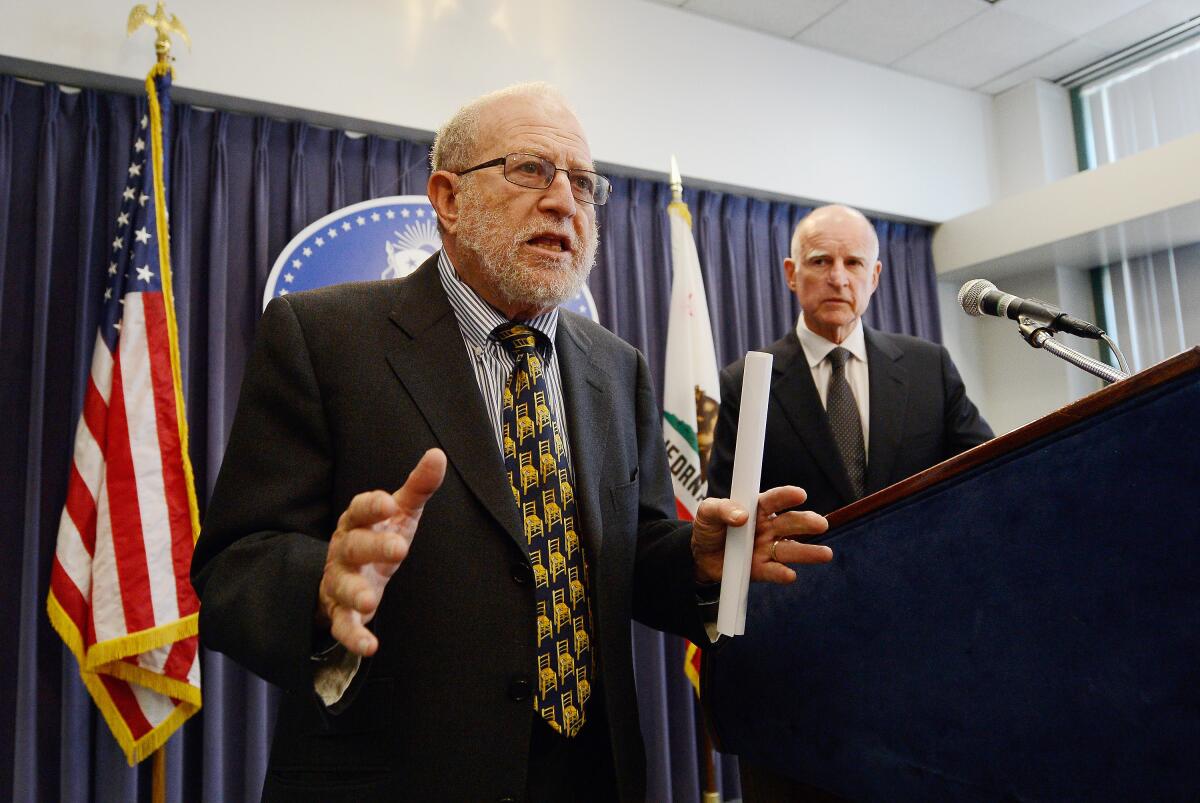Marty Morgenstern, longtime labor advisor to Jerry Brown, dies at 87

SACRAMENTO — Marty Morgenstern, who spent a career dedicated to labor issues and was a close advisor to former Gov. Jerry Brown, died last week at his home in a suburb of Sacramento. He was 87.
Friends and family said that Morgenstern, who stepped down as secretary of the California Labor and Workforce Development Agency in 2013, died of complications related to Parkinson’s disease.
Few advisors served Brown longer or with more loyalty than Morgenstern, a New York City native whose relationship with the Democratic governor spanned more than 50 years. In an interview, Brown said Morgenstern was one of the most intelligent and straightforward people he’s ever known.
“He was one of the few whose advice you could always rely on,” Brown said. “Because if he wasn’t sure, he would tell you.
When Brown returned to serve a third term as governor in 2011, one of his first appointments was Morgenstern as secretary of the Labor and Workforce Development Agency.
Morgenstern’s tenure lasted almost three years. When he left the administration, he told The Times that his theory of government could be explained in just three sentences: “We never have enough money. We’ve always got to be careful with the money we spend. And, always make sure you spend the minimum amount of money to get the job done.”
In his stint as labor secretary, Morgenstern helped Brown twist arms in the Legislature for a far-reaching overhaul of California’s workers’ compensation program in 2012. And he was a key negotiator in Brown’s effort that year to revamp public employee pension rules, a trimming of future benefits that was a hard sell among many in organized labor. One key provision, requiring negotiations to set some of the new employee contribution rates, was in line with Morgenstern’s own long belief in settling important labor issues through collective bargaining.
Julie Su, who was recruited by Morgenstern to serve as California’s labor commissioner in 2011, said perhaps even more lasting was his commitment to reshaping state labor law in an effort to crack down on wage theft. She said she had warned Morgenstern that the effort to help low-income workers would not be easy and would mean taking on some powerful business interests.
“He was so clear: If it’s the right thing to do, we should do it,” said Su, who is now President Biden’s deputy Labor secretary. “Those changes would not have happened without his leadership.”
Su said Morgenstern had to persuade her to fight for workers’ rights from the side of government service. It was the same journey he had made decades earlier.
The first in his family to graduate from high school or college, he joined the labor movement after taking a job in 1964 with New York City’s welfare department. When the agency’s employees walked off the job a year later, seeking higher pay and better working conditions, Morgenstern became a strike captain in East Harlem. His union interests grew in the years after the strike, and in 1968 he was elected president of the city’s Social Services Employee Union.
Morgenstern moved to Los Angeles to lead the state’s branch of the American Federation of State, County and Municipal Employees. In 1972, he joined the California State Employees Assn. and moved to Sacramento — a decision that ultimately led him to a friendship with Brown, who was then California’s secretary of state. After taking office as governor in 1975, Brown tapped Morgenstern to be director of the new state Office of Employee Relations. At the time, state government workers did not have the right to bargain collectively. Morgenstern’s long union experience helped guide Brown to ultimately sign a law in 1978 granting that right.
“He could keep my relations with labor unions in good order,” Brown said.
Morgenstern served on the state’s Public Employment Relations Board after Brown left office and in a variety of academic and consulting jobs before being appointed by then-Gov. Gray Davis as director of the state Deparment of Personnel Administration, serving in that post until Davis was recalled by voters in 2003.
Although he retired from the Brown administration in 2013, he returned in 2015 to serve as a board member for Covered California, the state’s health insurance exchange.
Friends and family say Morgenstern will be remembered for his efforts to help workers on the lowest end of the pay scale. His wife, Sylvia Pizzini, said that in his final days, Morgenstern recounted with friends who came to visit the effort he led in Brown’s first term to offer government employees, “janitors to judges,” across-the-board raises, a boost that added a larger percentage to the paychecks of those who made the least.
“He was very proud of that,” Pizzini said.
Su, who called Morgenstern an important mentor, said he treated struggling workers with the same respect afforded to the governor and high-ranking officials.
“He was always the voice of the working people in any room he was in,” she said.
More to Read
Sign up for Essential California
The most important California stories and recommendations in your inbox every morning.
You may occasionally receive promotional content from the Los Angeles Times.











